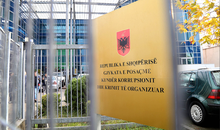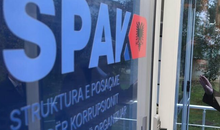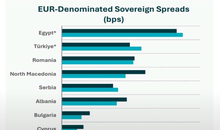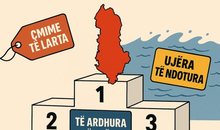
 Flash News
Flash News
The prosecution sends two Korça Municipality officials to trial
Violation with the €2.3 million tender, GJKKO imposes security measures on the head of the Public Procurement Commission, he is suspended from duty
"Partizani" case, trial postponed to July 21 at the Special Court
Requested change of security measure, hearing for Malltez postponed to July 7
Trial for 'Partizan' today, Malltezi from SPAK: Witch hunt, a case that started with Balla's baseless complaint
Output per working hour in Albania 35% lower than the regional average

The economies of the Western Balkans continue to face low levels of labor productivity compared to the European Union average, but the productivity of Albanian workers is also the lowest in the Region.
A comparative analysis by the Organization for Economic Co-operation and Development (OECD) published these days showed that the average output per hour worked in Albania was 18 USD for the period 2020-2023, the lowest result among the six Western Balkan economies (WB6).
From the period 2014-2016 to 2020-2023, labor productivity marked slow progress with only USD per hour worked, with a much slower pace than its neighbors. While the gap with the EU is very large as output per hour worked is 68 USD.
The highest value of output per working hour in the Region is in Montenegro with 33 USD from 27 during 2014-2016. In second place is North Macedonia with 31 USD, followed by Kosovo with 27 USD, Serbia with 25 USD output per working hour, Bosnia with 23 USD per hour and Albania with only 18 USD.
The average output per working hour in the Region is 27 USD, while Albania produces about 35% less per working hour than the regional level and about 1/4 of the EU average productivity.
The low labor productivity in our country is a consequence of the structure of our economy, dominated by agriculture and trade with low added value. Given that our economy is highly industrialized, investments in machinery, automation and ICT per capita are the lowest in the region.
Labor productivity in Albania remains the main obstacle to wage growth and economic convergence. Without structural reforms that foster innovation, technology and human capital, the gap with the region and the EU could further widen, international experts analyze. For Albanian business and policymakers, boosting productivity is no longer an option, but a necessity for long-term competitiveness.
The OECD suggests that our country should invest much more in quality education, vocational training, and creating conditions for young people and professionals to stay in the country so that the economy has the human capital to produce more value.
Informality and emigration have acted as obstacles to the productivity of the Albanian private sector. High informality is attributed in large part to low productivity, as informal businesses operate with weak capacities. Meanwhile, massive emigration has reduced the labor force, especially reducing its most qualified layer./Monitor
Latest news



Hamas says nearly 60 people killed in Gaza as Trump calls for ceasefire
2025-06-30 16:14:15
Drownings on beaches/ Expert Softa: Negligence and incompetence by institutions!
2025-06-30 16:00:03


European ports are overloaded due to Trump tariffs
2025-06-30 15:30:44
The prosecution sends two Korça Municipality officials to trial
2025-06-30 15:19:54

Lezha/ Police impose 3165 administrative measures, handcuff 19 drivers
2025-06-30 14:55:04
Young people leave Albania in search of a more sustainable future
2025-06-30 14:47:52
Record-breaking summer, health threats and preventive measures
2025-06-30 14:36:19


Constitution of the Parliament, Osmani invites political leaders to a meeting
2025-06-30 14:07:54

Heat wave 'invades' Europe, Spain records temperatures up to 46 degrees Celsius
2025-06-30 13:42:02
Accident in Vlora, car hits 2 tourists
2025-06-30 13:32:16

Kurti confirms participation in today's official dinner in Skopje
2025-06-30 13:03:27

Fight between 4 minors in Kosovo, one of them injured with a knife
2025-06-30 12:38:45

Report: Teenage girls the loneliest in the world
2025-06-30 12:20:40
Commissioner Kos and Balkan leaders meet in Skopje on Growth Plan
2025-06-30 12:07:59
Wanted by Italy, member of a criminal organization captured in Fier
2025-06-30 11:55:53
Hundreds of families displaced by wave of Israeli airstrikes in Gaza
2025-06-30 11:45:17

Zenel Beshi: The criminal who even 50 convictions won't move from Britain
2025-06-30 11:23:19
A new variant of Covid will circulate during the summer, here are the symptoms
2025-06-30 11:14:58


"Partizani" case, trial postponed to July 21 at the Special Court
2025-06-30 10:41:05
Uncontrolled desire to steal, what is kleptomania, why is it caused
2025-06-30 10:30:08
Requested change of security measure, hearing for Malltez postponed to July 7
2025-06-30 10:24:32


Output per working hour in Albania 35% lower than the regional average
2025-06-30 09:54:35


The trial for the "Partizani" file begins today
2025-06-30 09:27:57
22 fires in the last 24 hours in the country, 2 still active
2025-06-30 09:21:28
How is the media controlled? The 'Rama' case and government propaganda
2025-06-30 09:13:36
German top diplomat: Putin wants Ukraine to capitulate
2025-06-30 09:00:07
Foreign exchange, how much foreign currencies are sold and bought today
2025-06-30 08:44:38
Chart/ Sovereign risk for Albania from international markets drops significantly
2025-06-30 08:26:38
Horoscope, what do the stars have in store for you?
2025-06-30 08:11:44
Clear weather and passing clouds, here is the forecast for this Monday
2025-06-30 07:59:32
Morning Post/ In 2 lines: What mattered yesterday in Albania
2025-06-30 07:47:37
Milan make official two departures in attack
2025-06-29 21:57:23
6 record tone
2025-06-29 21:30:46
4-year-old girl falls from balcony in Lezha, urgently taken to Trauma
2025-06-29 21:09:58


Assets worth 12 million euros seized from cocaine trafficking organization
2025-06-29 19:39:43
Fire in Durrës, Blushi: The state exists only on paper
2025-06-29 19:17:48

Fire endangers homes in Vlora, helicopter intervention begins
2025-06-29 18:27:51
France implements smoking ban on beaches and parks
2025-06-29 18:02:08
England U-21 beat Germany to become European champions
2025-06-29 17:42:49
Trump criticizes Israeli prosecutors over Netanyahu's corruption trial
2025-06-29 17:08:10
Street market in Durrës engulfed in flames
2025-06-29 16:52:57

UN nuclear chief: Iran could resume uranium enrichment within months
2025-06-29 16:03:24
Albanian man dies after falling from cliff while climbing mountain in Italy
2025-06-29 15:52:01

Another accident with a single-track vehicle in Tirana, a car hits a 17-year-old
2025-06-29 15:07:15
While bathing in the sea, a vacationer in Durrës dies
2025-06-29 14:54:01
Sentenced to life imprisonment, cell phone found in Laert Haxhiu's cell
2025-06-29 14:26:40
77 people detained in protest, Vučić warns of new arrests
2025-06-29 14:07:46

From a hospital for children to a prison for politicians
2025-06-29 13:34:02
77-year-old man found dead in Pogradec
2025-06-29 13:13:10
The Metropolitan of Gjirokastra passes away
2025-06-29 12:52:27
The 39th session to elect the speaker of Kosovo's parliament also fails
2025-06-29 12:31:28
France bans smoking on beaches and parks
2025-06-29 12:16:23
Alarm from the Philippines: Albania, a growing destination for labor trafficking
2025-06-29 11:50:34

After 2-year ban, Paul Pogba signs with Monaco
2025-06-29 11:15:15
Can Albania produce all the food it needs?
2025-06-29 11:02:12



New study says: ChatGPT can damage your brain
2025-06-29 09:25:26
Violence and clashes at student protest in Belgrade
2025-06-29 09:12:22
Foreign exchange, the rate at which foreign currencies are sold and bought
2025-06-29 08:59:46

Horoscope, what do the stars have in store for you today?
2025-06-29 08:33:06
Hot weather, temperatures reach 39 degrees Celsius
2025-06-29 08:16:12
Morning Post/ In 2 lines: What mattered yesterday in Albania
2025-06-29 08:01:38

"Article Basha, wrong"/ Bardhi against Berisha's removal with statute
2025-06-28 21:41:41
Two cars collide in Pogradec, 3 people injured
2025-06-28 21:29:25
The first from the end... Albania's unwanted "victories"
2025-06-28 21:10:43
War with Ukraine, Putin: I am convinced that Russia will win!
2025-06-28 20:54:16
ChatGPT "destroys" the human brain! New study publishes disturbing results
2025-06-28 20:31:34
Triple accident in Lapraka, two people injured
2025-06-28 20:13:39

EMRI/ Albanian cocaine smuggler risks life in prison in the US
2025-06-28 19:34:14
